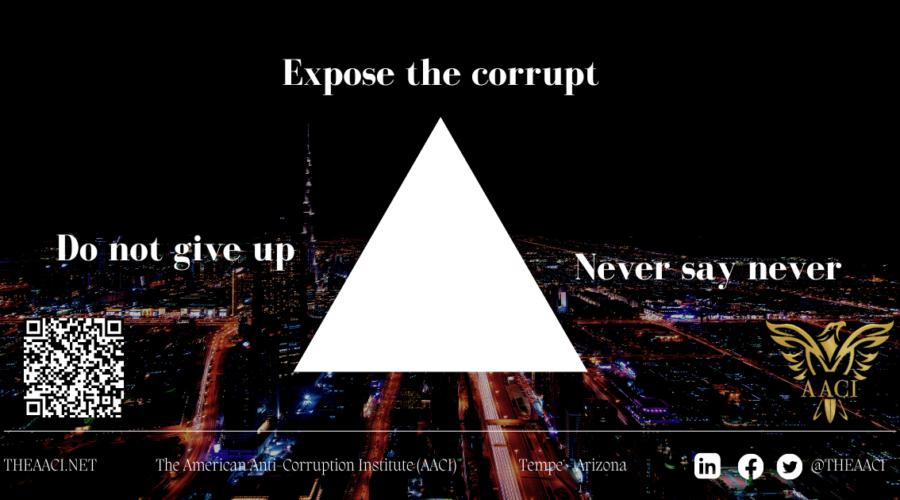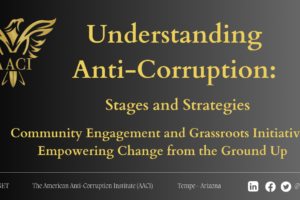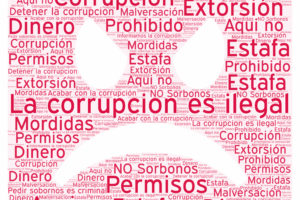Technical Staff
April 14, 2022
The American Anti-Corruption Institute (AACI) defines fighting corruption as a process effected by those charged with governance, employees, citizens, and other stakeholders to provide a reasonable assurance that those entrusted with power do not abuse it for private gain.
It is 1. Holistic, 2. Continuous, 3. Results-oriented, 4. Multidisciplinary, and 5. Encompasses all economic sectors (private and public, and non-profits) 1
Citizens, who are properly educated, have a significant role in the effective fight against corruption. Supported by the rule of law and an effective and independent judiciary, they deter the corrupt and their networks. Patriotic people expose corruption fearlessly.
What Corruption Exposure Means
Culprits know that corruption is illegal and there is a price they shall pay if there are caught. Hence they do all that they can to conceal their misdeeds. Exposure in the context of fighting corruption means the following:
It is a deliberate act of disclosure that is made, following the rules and regulations of the applicable law, by a person or persons who have or had privileged access to data or information of an organization or individual, about material illegality or other wrongdoing, whether actual, suspected, or anticipated, which implicates and is under the control of that organization or individual, to an authorized person or entity having the potential to rectify the wrongdoing.
Exposure is wider than whistleblowing. The American Anti-Corruption Institute (AACI) defines whistleblowing as follows:
“Whistleblowing is a deliberate non-obligatory act of disclosure that is made, following the rules and regulations of the applicable law, by a person or persons who have or had privileged access to data or information of an organization, about material illegality or other wrongdoing, whether actual, suspected, or anticipated, which implicates and is under the control of that organization, to an internal and/or external authorized person or entity having the potential to rectify the wrongdoing.” 2
Exposing Corruption Effectively
Methods of exposing corruption vary among countries. They depend on the local culture, values, norms, regulations, and laws. However, there are what we call “generic methods” that apply in most countries. Among these tools are the following:
1. Traditional and social media
2. Law enforcement authorities
3. Civil society organizations
4. Whistleblowing
Entitled preventive measures, Chapter 2 Article 5 (1) of the United Nations Convention Against Corruption (UNCAC) requests member countries to “develop and implement or maintain effective, coordinated anti-corruption policies that
(a) promote the participation of society, and
(b) reflect the principles of the rule of law, proper management of public affairs and public property, integrity, transparency, and accountability.
The Corrupt Fears Exposure
Exposing corruption is an act of bravery for the sake of good citizenship. The criminal idolizes his ill-gotten wealth. He’s a complete narcissist. As a result, he is terrified of any action that puts him at risk of losing something. His work, reputation, money, and social position, among other things, might all be lost.
As a result, the effective fight against corruption requires the effective engagement of citizens who exposes culprits by all possible legal means. Never say never. Do not give up. Expose the corrupt.
Notes
1 Exam Unit, “Principles of Fighting Corruption” in Certified Anti-Corruption Manager (CACM) Review Textbook, 2022 ed. (United States of America: The Exam Unit of The American Anti-Corruption Institute LLC., January 14, 2022) page 39.
2 Exam Unit, “Whistleblowing,” in Certified Anti-Corruption Manager (CACM) Review Textbook, 2022 ed. (United States of America: The Exam Unit of The American Anti-Corruption Institute LLC., January 14, 2022) page 523.
Photo by Pixabay: https://www.pexels.com/photo/high-rise-buildings-during-night-time-photo-219692/











































